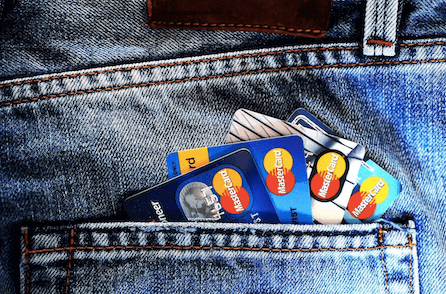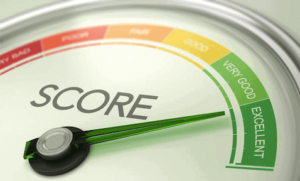According to most credit bureaus, it typically takes at least 6 months to build up a good credit rating. However, it is possible to get there faster or it can also sometimes take longer to build good credit.
This guide will delve deeper into what actually is a credit score and how those with a low score can try to improve their rating safely and quickly.
What Is A Credit Score?
A credit score is a numerical rating based on information available in your credit report. The report is devised by credit reporting agencies who compile information from banks, courts and other businesses to formulate your credit history which includes your current or past debts, payment histories and whether you have ever defaulted on a loan. This is then used to calculate a score to determine how reliable you are when it comes to credit and how likely you are to pay back a loan on time.
The numbers typically range from 300 to 850, with a higher score indicating a more trustworthy borrower. Generally credit scores ranging from 580 to 669 are considered fair (see loans for 650 credit scores), 670 to 739 are deemed good, 740 to 799 are classified as very good and 800 and above are regarded as excellent.
Credit scores change over time when new information is reported, such as taking out more credit or paying back a loan on time. Consumers actually have multiple credit scores, since different credit reporting agencies calculate scores differently. Although the scores are generally quite similar.
What Factors Are Used To Calculate A Credit Score?
According to the FDC, the main criteria that goes into calculating a credit score include:
- Your bill-paying history – This includes whether you have any existing debt, and the number and types of loans or accounts you have open.
- Quantities – How much of your available credit you are using and for how long you have had any loan accounts open.
- Debt – If you have ever had a debt sent to collection, a foreclosure or bankruptcy, and if so, how long ago.
- Recent Activity – Whether you have applied for new or more credit in recent times.
Why Is A Good Credit Score Useful?
A good credit score is extremely useful as it indicates to banks and other financial institutions such as loan providers that you can handle your finances well. The rating is used to help institutions make important decisions. For instance landlords may look at your credit score to see if you would be likely to pay your rent on time, banks or loan providers could check your score if you wanted to borrow money and even employers who are hiring may look at your rating to determine if you are a trustworthy candidate.
It is important to try to have a good credit score since it comes with many benefits. Those with a good credit score tend to be offered better loan terms than someone with a poor score who may be regarded as a risk. So if someone with a very good credit rating wanted to apply for a payday loan, they may be offered a lower interest rate or more time to make repayments than someone with a bad credit score.
Good credit therefore opens the door to many opportunities. It can certainly make life easier and so is an important financial marker to consider.
How Long Does It Typically Take To Get A Good Credit Rating?
The length of time it takes to build a good credit score depends on what situation you are in. If you are trying to rebuild a poor credit score, then it may take longer than for instance if you were trying to create a new score from scratch.
Since credit scores are based on the last 7 years of credit history, past bad credit actions can weigh down your score. It can therefore take some time to try outnumber past difficulties with recent better credit activity. More recent transactions do however carry more weighting so it is worth practicing good habits as soon as possible as the sooner you add good credit behavior, the sooner your score will start to improve.
How long it will take to improve your score depends on how bad your credit was originally. Very low starting credit scores may see improvements in as little as 3 months, however it will still take time to reach a good rating.
Those with no credit history will take around 6 months to get a good score. Unfortunately there are not really any shortcuts but having a clean slate is extremely convenient as if you make all your payments on time and do not overuse credit, then you are on your way to an excellent credit score.
How Can I Improve My Credit Score?
There are many ways you can try to make concrete improvements to your credit rating:
Check Your Credit Report
Firstly, it is important to understand the information in your credit report as this can help you achieve a good credit score. You may be able to spot some errors or mistakes that could be negatively impacting your score, so rectifying this should help to make a positive difference. For instance, if you see accounts on your credit report that do not belong to you, getting them removed could improve your score overnight!
Pay Your Bills On Time
Of the utmost of importance is making sure you pay any bills on time. How you manage any loans will significantly influence your rating and so it is essential to make all payments that are expected of you. To help make this easier, it can be handy to create a budget to help stay on track and work out when your payments are due, how much is due and how much money you will need to cover this. Or you may wish to consider automatic payments using your bank’s bill pay service as this will ensure you pay on-time which will reflect well on your credit report.
If you are unable to pay on time then it is important to get in touch with your banker or creditor immediately. They may be able to help you by offering a more flexible repayment plan before it becomes a problem that affects your credit score.
Eliminate Existing Debts
If you are trying to repair a bad credit history, paying down any existing debts will significantly improve your score. Not only can it be expensive to have outstanding loans or credit card balances at their limit, but it can have a negative impact on your credit rating. So eliminating these debts will certainly stand you in good stead to getting the credit score that you desire.
A useful strategy is to pay off the debt with the highest interest rate first to prevent further interest from accumulating and to save you money in the long run, or you may wish to pay the lowest balance debts off first to cross them off the list quickly. You should also prioritize paying down or paying off existing loans and credit cards before adding new debts if possible.
Making numerous applications at once may also lower your score since it can be reported to credit reporting agencies and may appear to them that you are in desperate need of funds.
How Can I Get A Good Credit Score If I Do Not Have A Credit History?
If you are looking to build a credit history, you could consider getting a credit card with minimal interest rates. Paying some monthly expenses through this could be a good way to improve your credit score, as long as you pay on time. Just make sure you find out all the terms before agreeing to the card, for instance credit limits or any fees or penalties that you could incur so you know how to use it correctly and without jeopardizing your credit history.
Authorized user accounts are also another way to build your credit score. If you have someone trustworthy such as a parent or sibling who has good credit and is willing to add you to one of their cards, even though you may not pay the bill for the card, then this can also work to increase your rating.
Concluding Thoughts
Building a good credit score may take you a couple of months or even up to a year. However, following the tips mentioned above should help accelerate your journey towards a good rating. Making sure you only borrow money for things you really need and monitoring your credit report regularly should also help to stand you in good stead. Whilst working on your score may take a little patience as it can be a long term game, the rewards will be worth it when you find yourself needing a good credit rating for a big purchase such as a mortgage or an important life event such as a new job.






